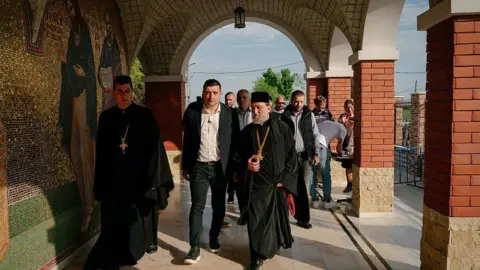Romanians will try again to elect a new president today, six months after the first attempt ended in scandal and confusion.
A radical outsider with mystical leanings, Calin Georgescu, came first on 24 November, but that result was annulled over allegations of campaign fraud and Russian interference.
In February, US Vice President JD Vance sharply criticised Romania for that decision, sending shockwaves through a Romanian political establishment which leans heavily on its special relationship with the US. Georgescu was nevertheless barred from taking part in today’s rerun.
This election pits a nationalist, George Simion, leader of the Alliance for the Union of Romanians (AUR), against three centrists: the popular mayor of Bucharest Nicusor Dan; Crin Antonescu, a liberal who represents the governing Social-Democrat and National Liberal coalition; and Elena Lasconi, an independent.
Seven other candidates are on the ballot paper. If no candidate wins over 50% of the vote, a run-off between the first two candidates will be held on 18 May.
“This election is not about one candidate or another, but about every Romanian who has been lied to, ignored, humiliated, and still has the strength to believe and defend our identity and rights,” Simion posted on X on Friday.
Opinion polls – notoriously unreliable in Romania – suggest that he will come first today, then will face a tough contest with either Nicusor Dan or Crin Antonescu in the run-off.
The result is awaited nervously in European capitals, Washington, Kyiv and Moscow. Romania is an important transit route for weapon systems and ammunition to Ukraine. The country has a US missile defence shield at Deveselu, and three major airbases from which Nato flies air policing missions up to the border of Ukraine and Moldova, and out over the Black Sea.
Ukraine exports 70% of its grain down the Black Sea coast, through Romanian territorial waters, towards Istanbul. The Romanian navy demines those waters, and the Romanian air force trains Ukrainian pilots to fly F-16s. The Trump administration is reassessing its commitment to Romania. A visa-waiver agreement was abruptly cancelled on the eve of the election.
“Forget about any more help to Ukraine if Simion becomes president,” says George Scutaru, a security expert at the New Strategy Center in Bucharest. As head of the National Security Council, the president can veto any decision, and has a strong influence on security policy. But Scutaru expresses “prudent optimism” that one of the centrists will win the run-off.
Public resentment at Romanian financial support for Ukrainian refugees has been a central plank in Simion’s campaign, though he denies he is pro-Russian.
On a baking May afternoon, crowds of sightseers throng the gardens of the Cotroceni Palace, the presidential residence in the west of Bucharest. The decision by interim President Ilie Bolojan to open the buildings and gardens to the public is very popular among the visitors.
White and purple irises line the paths beneath ancient horse chestnuts in full flower. A military band marches among flowerbeds of pansies and violets. The palace is a former monastery, converted in the 17th century, which became home to the Romanian royal family in the 19th century.
“I can’t really imagine Simion in here…” Ionut, a satirical writer, tells me beside an ornate waterfall, looking up at the palace walls. He voted for Simion in the first round of the election last November, out of anger at the constant delays to Romania’s full membership of the Schengen free-travel zone. And frustration with Romania’s outgoing president, Klaus Iohannis.
But Romania finally joined the Schengen land-borders on 1 January, and Iohannis stepped aside the same month. “Romanians are less angry now,” he believes. He told his daughter he will vote for Nicusor Dan in this election, but hasn’t quite made up his mind.
Ana, a management consultant, walking with her family through the palace gardens, also supports Nicusor Dan. “I want to vote for both continuity and change,” she says. “Continuity in Romania’s relationship with Europe, but change as far as corruption is concerned. We young people don’t relate to the old parties any more,” – something Nicusor Dan has in common with Simion.
Many in Romania’s large diaspora – a million are registered to vote – have already cast their ballots, especially in Spain, Italy, Germany and the UK. They are invisible in opinion polls, and could easily sway the final result.
[BBC]
